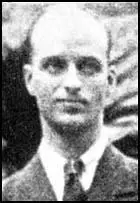James Roosevelt

James Roosevelt, the son of Franklin D. Roosevelt and Eleanor Roosevelt, and brother of Franklin Roosevelt Jr., was born in New York City on 23rd December, 1907. After graduating from Harvard University in 1930 he became an insurance broker in Boston. He eventually became president of Roosevelt & Sargent Incorporated.
Roosevelt joined the United States Marines in November 1940. After Japan attacked at Pearl Harbor two leading marines, Evans Carlson and Merritt Edson advocated the use of guerrilla warfare against the Japanese Army in the Pacific War. Eventually Edson was given command of the 1st Raider Battalion whereas Carlson got the 2nd Raider Battalion. Roosevelt became Carlson's assistant. Based in San Diego, the Carlson's Raiders were taught the military tactics employed by the Red Army against the Japanese. This included learning how to kill silently and quickly. Following the example of the guerrillas in China, Carlson abolished the traditional privileges enjoyed by officers. They ate the same food, wore the same clothes and carried the same equipment.
In August 1943 the 2nd Raider Battalion landed on the small island of Makin Atoll. After two days of fighting Carlson's men were able to destroy the radio station, burned equipment and captured important documents. Thirty marines were killed before General Alexander Vandegrift ordered them to leave the island. As a result of the raid the Japanese Army fortified the Gilbert Islands. On 4th November 1943, the Carlson's Raiders landed in Guadalcana. Over the next month Carlson's men killed more than 500 Japanese while only losing 17 men.

By the end of the war Roosevelt had reached the rank of brigadier general. After leaving the army he became chairman of Roosevelt & Haines. A member of the Democratic Party he was an unsuccessful candidate for Governor of California in 1950.
Roosevelt was elected to the House of Representatives and served between 3rd January, 1955 and 30th September 1965. A strong opponent of McCarthyism Roosevelt was one of the first politicians to attack the tactics of Joseph McCarthy. He was also the only member of the House of Representatives to voted against giving the House of Un-American Activities money.
He resigned from Congress to become the United States representative to United Nations Economic and Social Council.
James Roosevelt died in California on 13th August 1991.
Primary Sources
(1) Evans Carlson, letter to Agnes Smedley (November 1943)
There were two factors which modern military leaders do not seem to understand or prefer to ignore. One, comfort and personal convenience are not consonant with the conduct of military-naval operations against an alert and tenacious enemy; two, men are inspired to fight with all that is within them only by leadership based on merit, a profound knowledge of the reasons they fight, and the conviction that the things for which they fight are worth fighting for. We will win because of our economic strength, but the sacrifice in men and treasure will be out of proportion to our effort and far beyond what it would be if we as a nation had learned that there is no smooth road to freedom.
(2) A member of the 2nd Raider Battalion who served under Roosevelt and Evans Carlson during the Second World War was interviewed for Michael Blankfort's book, The Big Yankee: The Life of Carlson of the Raiders (1947)
Day after day we followed the Old Man's jungle-guerrilla tactics, putting into practice his theory of the mobile fire team. The team worked wonders. Toward evening we'd make a base; then next morning fan out patrols to find the enemy as well as the site of a forward base. The Old Man would okay it, and we'd all move up to it. The next day would be the same. The Old Man led the whole battalion over the ridge. Carlson called out, "Let's sing, Onward, Christian Soldiers." We didn't care whether or not the Japs heard us. We felt good singing.
We had spent a month in the jungle, and marched one hundred and fifty miles, met the enemy daily, captured and destroyed his guns and ammunition and food and medical supplies; we reassured the command that nothing important was going on in the interior; we mapped out his exit-west route; we destroyed 'Pistol Pete,' and finally we killed officially 488 Japs, but the Seabees who went in later to bury them said we killed 700. For all this, we lost 17 men, and 17 wounded.
(3) Howard Zinn, A People's History of the United States (1980)
In the early fifties, the House Un-American Activities Committee was at its heyday, interrogating Americans about their Communist connections, holding them in contempt if they refused to answer, distributing millions of pamphlets to the American public: "One Hundred Things You Should Know About Communism" ("Where can Communists be found? Everywhere"). Liberals often criticized the Committee, but in Congress, liberals and conservatives alike voted to fund it year after year. By 1958, only one member of the House of Representatives (James Roosevelt) voted against giving it money. Although Truman criticized the Committee, his own Attorney General had expressed, in 1950, the same idea that motivated its investigations: "There are today many Communists in America. They are everywhere - in factories, offices, butcher shops, on street corners, in private business - and each carries in himself the germs of death for society."
